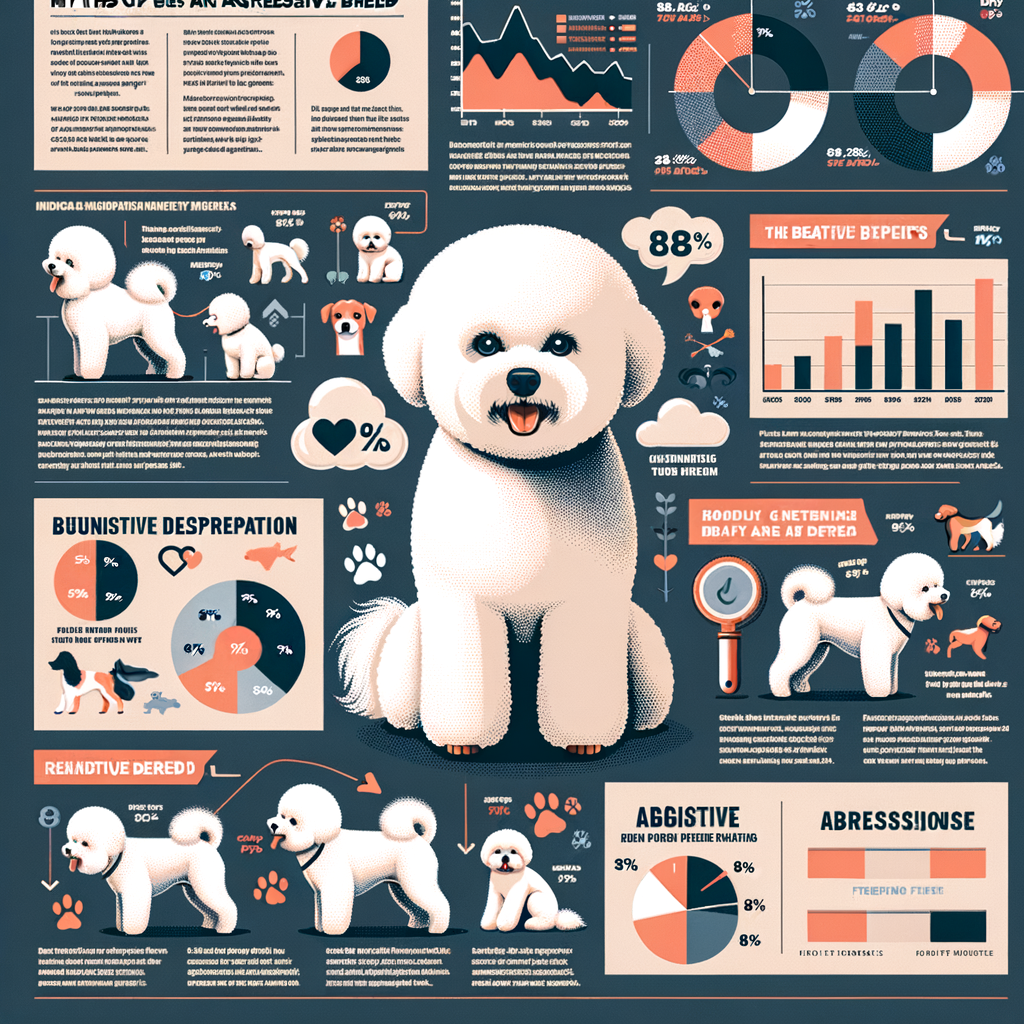
Introduction: Understanding Bichon Frises
The Bichon Frise is a small, fluffy, and cheerful dog breed that has won the hearts of many dog lovers around the world. In this introductory section, we will delve into the world of Bichon Frises, exploring their breed specifics, characteristics, and personality traits. This will give you a comprehensive understanding of these adorable dogs.
- Overview of Bichon Frises breed
- Bichon Frises characteristics
- Bichon Frises personality
The Bichon Frise, often simply referred to as a ‘Bichon’, is a small breed of dog known for its white, fluffy coat and cheerful disposition. Originating from the Mediterranean area, this breed has a rich history that dates back to the 14th century. Bichons are often categorized as ‘toy’ dogs due to their small size, typically weighing between 10 to 20 pounds and standing about 9 to 12 inches tall at the shoulder.
Bichon Frises are easily recognized by their distinctive physical characteristics. They have a rounded skull, slightly rounded eyes that are dark and alert, and a tail that is plumed and carried over the back. Their most notable feature, however, is their dense, curly white coat. This coat is hypoallergenic, making Bichons a suitable choice for those with allergies. It’s important to note that their beautiful coat requires regular grooming to keep it healthy and looking its best.
Bichon Frises are known for their friendly and outgoing personality. They are sociable dogs that love to be around people and are known to get along well with other animals. Bichons are intelligent and quick learners, which makes them relatively easy to train. However, they can be stubborn at times, so consistent, positive reinforcement training methods work best. Despite their small size, Bichons are energetic and love to play, making them a great choice for families with children.
In the following sections, we will debunk some common myths about Bichon Frises, particularly regarding their temperament and behavior. We will also provide a case study to illustrate these points. So, stay tuned to learn more about these adorable, fluffy companions!
Debunking Myths: Bichon Frises Aggression
When it comes to understanding the behavior of Bichon Frises, it’s important to separate fact from fiction. There are many misconceptions about this breed, particularly when it comes to aggression. In this section, we will debunk some of these myths and provide a clearer picture of the true nature of Bichon Frises.
- Common misconceptions about Bichon Frises behavior
- Understanding the difference between aggression and fear
One of the most common misconceptions about Bichon Frises is that they are inherently aggressive. This is simply not true. Bichon Frises, like any breed, can exhibit aggressive behavior under certain circumstances, but this is not a characteristic trait of the breed. In fact, Bichon Frises are known for their friendly and sociable nature. They are typically good with children and other pets, making them a popular choice for families.
Another misconception is that aggression in Bichon Frises is a sign of a bad temperament. However, it’s important to understand that aggression can often be a response to fear or anxiety. Bichon Frises are a small breed and can sometimes feel threatened by larger dogs or unfamiliar situations. This fear can manifest as aggression, but it does not mean that the dog is naturally aggressive. Understanding this difference can help in managing and preventing aggressive behavior in Bichon Frises.
In conclusion, it’s essential to understand that Bichon Frises are not an aggressive breed. Any signs of aggression are likely due to fear or anxiety, and with proper training and socialization, these behaviors can be managed effectively. So, let’s debunk the myth and appreciate Bichon Frises for their true nature – friendly, sociable, and loving.
Case Study: Aggressive Bichon Frises?
Let’s delve into some real-life examples to better understand the behavior of Bichon Frises. Our first case study involves a misunderstood Bichon Frise.
Case 1: The misunderstood Bichon Frise
-
Background of the case:
Meet Max, a 3-year-old Bichon Frise who was often labeled as ‘aggressive’ by his owners. Max was adopted from a shelter and had a history of being passed around from one home to another.
-
Behavioral analysis:
Upon observation, it was noted that Max’s so-called ‘aggression’ was more of a defensive reaction. He would growl and snap when approached too quickly or when he felt cornered. This behavior is often a result of fear or anxiety, not aggression. Max’s past experiences may have led him to perceive certain situations as threatening, triggering his defensive behavior.
-
Outcome and lessons learned:
With patience, consistent training, and positive reinforcement, Max’s behavior improved significantly. His owners learned to read his body language better and gave him the space he needed to feel safe. This case teaches us that labeling a dog as ‘aggressive’ without understanding the root cause of their behavior can lead to misinterpretations. It’s essential to remember that every dog, including Bichon Frises, has its unique personality and past experiences that shape their behavior.
In conclusion, it’s crucial to understand that a dog’s behavior is often a reflection of their environment, experiences, and how they are treated. Labeling a dog as ‘aggressive’ without proper understanding can lead to unnecessary fear and stigma around the breed. Remember, with patience, love, and proper training, every dog can thrive.
Case 2: The Fearful Bichon Frise
- Background of the Case
Meet Bella, a two-year-old Bichon Frise. Bella was adopted from a rescue center where she had a history of being fearful and anxious. Her new family noticed her aggressive behavior when she was around strangers or in unfamiliar environments. Bella would growl, bark, and sometimes even bite.
- Behavioral Analysis
Bella’s behavior was not typical of a Bichon Frise. These dogs are known for their friendly and cheerful disposition. Bella’s aggression was likely a result of her fear and anxiety. When she felt threatened or scared, she would react aggressively to protect herself.
Behavior Reason Growling Fear Barking Anxiety Biting Self-defense - Outcome and Lessons Learned
With patience, love, and professional training, Bella’s behavior improved significantly. Her family learned that her aggression was not a breed characteristic but a response to her past experiences. They also learned that understanding a dog’s behavior is crucial in helping them overcome their fears.
Here are some key takeaways from Bella’s case:
- Aggression in dogs is often a response to fear or anxiety.
- Understanding a dog’s past can help explain their behavior.
- Professional training can significantly improve a dog’s behavior.
- Patience and love are essential when dealing with a fearful dog.
Bichon Frises Temperament: What to Expect
When it comes to understanding the temperament of Bichon Frises, it’s essential to consider their typical behavior and the factors that can influence their temperament. Let’s delve into these aspects to get a clear picture of what to expect from these adorable dogs.
-
Typical Bichon Frises behavior
Bichon Frises are known for their cheerful and playful nature. They are often described as ‘happy-go-lucky’ dogs, always ready to play and interact with their human companions. Bichon Frises are also known for their intelligence and curiosity, which makes them quick learners and keen observers.
They are generally friendly towards other dogs and animals, and they are particularly good with children. This makes them an excellent choice for families. However, they can be a bit stubborn at times, which might require a bit of patience during training sessions.
Despite their small size, Bichon Frises are quite energetic and require regular exercise to keep them healthy and happy. They love to play fetch and enjoy going for walks. But remember, they also enjoy their downtime and love to cuddle up with their owners.
-
Factors influencing Bichon Frises temperament
Several factors can influence a Bichon Frise’s temperament. These include their upbringing, training, socialization, and overall health.
Proper socialization from a young age is crucial in shaping a Bichon Frise’s temperament. Regular exposure to different people, animals, and environments can help them become well-rounded and confident dogs. On the other hand, lack of socialization can lead to fearfulness or aggression.
Training also plays a significant role in a Bichon Frise’s behavior. Positive reinforcement methods work best with this breed. They respond well to treats, praises, and playtime as rewards for good behavior. Harsh training methods can lead to fear and anxiety, which can negatively affect their temperament.
Lastly, a Bichon Frise’s overall health can influence their temperament. Like any other breed, if they are not feeling well or are in pain, they may become irritable or aggressive. Regular vet check-ups and a healthy diet can ensure they stay in good health.
In conclusion, Bichon Frises are generally cheerful, playful, and friendly dogs. However, their temperament can be influenced by factors such as socialization, training, and health. Understanding these aspects can help you ensure your Bichon Frise grows into a happy and well-behaved companion.
Key Takeaways: Understanding Bichon Frises Behavior
Let’s summarize the key points we’ve discussed about understanding the behavior of Bichon Frises. These points are crucial for any Bichon Frise owner or anyone considering adopting this breed.
- Importance of Early Socialization
- Understanding Bichon Frises Body Language
- How to Handle Potential Aggression
Early socialization is a vital aspect of a Bichon Frise’s upbringing. It helps them become well-rounded dogs. Puppies should be exposed to a variety of people, environments, and other animals from a young age. This exposure helps them to grow into confident, sociable adults. Remember, a well-socialized Bichon Frise is a happy Bichon Frise.
Bichon Frises, like all dogs, communicate largely through body language. By understanding their body language, you can better understand their needs and emotions. For example, a wagging tail often signifies happiness, while flattened ears may indicate fear or anxiety. Always pay attention to your Bichon Frise’s body language to ensure their well-being.
While Bichon Frises are generally friendly and sociable dogs, they can display signs of aggression if they feel threatened or scared. It’s important to handle such situations with care. Avoid punishing or yelling at your dog, as this can escalate the situation. Instead, try to understand the root cause of their aggression and address it. If necessary, consult with a professional dog trainer or behaviorist.
In conclusion, understanding your Bichon Frise’s behavior is key to ensuring their happiness and well-being. By socializing them early, understanding their body language, and handling potential aggression appropriately, you can build a strong, positive relationship with your furry friend.
Conclusion: Debunking Dog Breed Myths
As we wrap up our comprehensive guide on Bichon Frises, it’s crucial to debunk some of the common myths surrounding this breed. Misconceptions can lead to misunderstandings, which can ultimately affect our relationship with these adorable dogs. Let’s summarize what we’ve learned and address the final thoughts on Bichon Frises aggression.
- Summary of Bichon Frises Breed Information
- Final Thoughts on Bichon Frises Aggression
The Bichon Frise is a small, cheerful breed known for its fluffy white coat and playful demeanor. They are sociable dogs who love being around their human families. They are intelligent and can be trained easily with positive reinforcement. Bichon Frises are generally healthy, but they can be prone to certain health issues like allergies and hip dysplasia. Regular vet check-ups and a balanced diet can help maintain their health.
Contrary to the common myth, Bichon Frises are not inherently aggressive dogs. Like any other breed, their temperament largely depends on their upbringing, training, and socialization. Bichon Frises can show signs of aggression if they are not properly socialized or if they feel threatened. However, with proper training and care, they can be friendly and loving companions.
In conclusion, it’s important to remember that every dog is an individual. While breed traits can give us a general idea of what to expect, the dog’s upbringing and environment play a significant role in shaping their behavior. So, let’s debunk the myth and appreciate Bichon Frises for the loving and friendly dogs they truly are.








